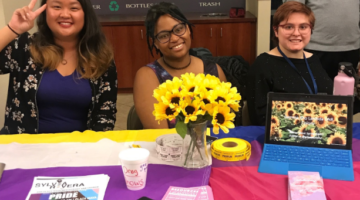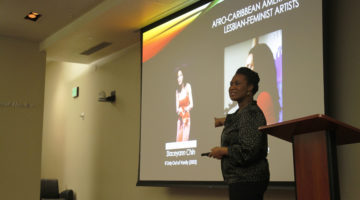October is LGBT History Month, meaning many major news outlets have been publishing articles concerned with everything LGBT, from pride celebrations to LGBT icons in history. This reception is undoubtedly indicative of the queer community’s upward mobility in society.
Although media representation of minority groups — in this case queer people — is paramount to achieving societal equity, restricting this representation to the purview of a term such as LGBT is problematic.
Admittedly, it is a victory that LGBT History Month exists at all. With the deluge of conservative flak elicited by the queer community, it is nothing short of a miracle that we are able to celebrate queerness on such a broad, almost national, level. But hailing queer history as solely LGBT excludes everybody else.
Indeed, the full initialism is LGBTQQIP2SAA: lesbian, gay, bisexual, transgender, queer, questioning, intersex, pansexual, two-spirited, asexual and ally. This, of course, would be onerous to say whenever referring to the queer community.
But that is why we have the word “queer.” Yes, it is true that the word began as a slur uttered by homophobic bigots, but it has since been reclaimed by many queer people. And yes, LGBTQQIP2SAA is fairly large in scope, but even this term has its limitations — it fails to account for future and/or unknown sexual identities and gender identities. What about demisexuality, referring to people who only experience sexual attraction after a strong emotional bond? How about genderfluidity, referring to people who experience changes in gender identity? These two identities, as well as many others, are not included in the ostensibly “all-encompassing” LGBTQQIP2SAA.
Some activists have suggested the use of a plus sign at the end of the initialism in order to account for the identities not included. This is a seemingly innocuous act, and it obviously indicates that there are more sexualities and forms of gender expression that have been left unstated; however, doing this reduces somebody’s identity to a mere symbol — queerness is not a plus sign.
Therefore, “queer” is an all-inclusive alternative. Many colleges, such as Hampshire College and Mills College, have already embraced the term, calling programs that some would indicate as “LGBT Studies” a more comprehensive “Queer Studies” instead. Even at UNR, the Queer Student Union, a pre-eminent queer group on campus, is known by the word.
As media professionals, it is our duty to give a voice to the voiceless, or so the adage goes. Repeatedly circumscribing queerness by imposing the label of LGBT on it doesn’t give a voice so much as it obfuscates the people who identify beyond those four letters.
Instead of celebrating LGBT History Month, we should be celebrating Queer History Month. Of course, it is great, and arguably necessary, to celebrate the achievements of lesbian, gay, bisexual and transgender individuals, but we must celebrate the myriad other achievements in the queer community.
In recent domestic queer news, Nicolette Robbins, an alumnus from Bates College, co-authored a groundbreaking paper featured in the September issue of Archives of Sexual Behavior about the coming-out experience for asexual individuals. Asexuality is largely disregarded as a legitimate sexual identity, not only by straight people but by many individuals in the queer community itself.
Earlier this year an interview with an agender, asexual person (let’s call them “Cody”) for the feminist blog Jezebel discussed some of the problems with asexual awareness.
“The worst personal example came up with a new doctor,” Cody said. “When I told him I was asexual, he said that ‘wouldn’t be physically possible’ because I have given birth to a child. And he told me that I couldn’t and shouldn’t be asexual because ‘having sex is the most important part of the human experience. It’s what makes us human.’”
In recent international queer news, a French court has legally recognized a citizen of the country to be intersex, a landmark ruling challenging the commonly accepted gender binary of male/female. For a long time, being intersex was seen (and still is by many) as a medical aberration, and only recently has there been a vehement movement to end such hurtful views.
These are the voices that need to be elevated in addition to the strictly LGBT voices. Embracing the word “queer” is the first step we must take in order to create a more accepting, inclusive world for queer people and everyone in between.
In such a pivotal moment in queer history, it is necessary that we not only establish a sense of solidarity among supporters and queer people, but also within the queer community itself. Society seems to be embracing progressive ideals little by little, and a unified queer movement would only help to expedite the establishment of equitable policies for all.











